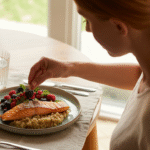Understanding Inflammation: The Body’s Double-Edged Sword
Inflammation is a fundamental, and often beneficial, process your body uses to protect itself from harm. However, when this natural defense mechanism goes awry, it can become a chronic issue that contributes to a wide range of health problems. Understanding its causes is key to maintaining balance and long-term health.
Fundamentally, there are two distinct types of inflammation: acute and chronic.
Acute Inflammation: The First Responder
Acute inflammation is the body’s immediate, short-term response to an injury, infection, or irritant. It’s a vital part of the healing process. Think of the redness, swelling, heat, and pain you experience after a cut, a bee sting, or during a sore throat. This is your immune system rushing to the scene.
Common causes of acute inflammation include:
- Infections: Attacks by pathogens like bacteria, viruses, or fungi.
- Injuries: Physical harm such as scrapes, cuts, or blunt trauma.
- Irritants: Exposure to foreign objects like a splinter or chemical irritants.
In these cases, inflammation is the hero, working to eliminate the threat and repair damaged tissue. Once the job is done, the inflammatory process subsides.
Chronic Inflammation: The Persistent Problem

Chronic inflammation is a slower, long-term inflammatory response that can last for months or even years. It occurs when the body fails to eliminate the initial cause of inflammation or when the immune system mistakenly attacks healthy tissues. This persistent, low-level inflammation can damage cells and organs over time and is linked to numerous chronic diseases, including heart disease, type 2 diabetes, arthritis, and certain cancers.
The primary drivers of harmful chronic inflammation are largely tied to lifestyle, environment, and underlying health conditions.
Key Causes of Chronic Inflammation:
- Dietary Habits: A diet high in pro-inflammatory foods is a major contributor. This includes:
- Processed Foods: Items high in refined carbohydrates (white bread, pastries), added sugars, and unhealthy trans fats.
- Sugary Beverages: Sodas and sweetened juices can trigger inflammatory responses.
- Red and Processed Meats: Frequent consumption is linked to higher levels of inflammatory markers.
- Certain Oils: An excess of omega-6 fatty acids, found in many vegetable oils like corn and soy oil, without a balance of anti-inflammatory omega-3s, can promote inflammation.
- Lifestyle Factors:
- Obesity: Fat tissue, particularly visceral fat around the organs, is metabolically active and can release a steady stream of inflammatory chemicals.
- Lack of Physical Activity: A sedentary lifestyle is associated with higher levels of chronic inflammation.
- Chronic Stress: Prolonged psychological stress triggers the release of cortisol and other hormones that can lead to persistent inflammation.
- Poor Sleep: Inadequate or disrupted sleep can disrupt the body’s regulatory systems and promote an inflammatory state.
- Smoking and Excessive Alcohol: Both introduce toxins into the body that can provoke a continuous inflammatory response.
- Medical Conditions:
- Autoimmune Disorders: Conditions where the immune system mistakenly attacks the body’s own cells, such as rheumatoid arthritis, lupus, and psoriasis.
- Persistent Infections: When the body is unable to fully clear a pathogen, such as certain bacteria or viruses.
- Long-Term Exposure to Irritants: Ongoing exposure to pollutants, industrial chemicals, or other environmental toxins that the body cannot eliminate.
In essence, while acute inflammation is a necessary and temporary healing response, chronic inflammation is a persistent state of high alert that can wear the body down, driven largely by modern lifestyle choices and underlying health issues.






